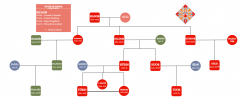Here is the outline for Season 7 Episode 9:
The Silmarillion Film Project Season 7, Episode 10: Central conflict: Protagonist: A-Plot: B-Plot: C-Plot: Frame:. FA 471 Episode Outline Teaser: Act I : FA 471 Scene 1: Scene 2: Scene 3: Scene 4: Act II : Scene 5: Scene 6: Scene 7: ...

docs.google.com
The Silmarillion Film Project
Season 7, Episode 9: Death of Laughter? (suggested title)
Central conflict:
Protagonist: Ulfang
A-Plot: News of the young dragons growing in Rivil’s Well reshapes the plan to attack Dorthonion.
B-Plot: The Plague strikes Dor-lómin and other human settlements. Death of Lalaith (3). Huor worries for pregnant Rían. Húrin deals with his daughter’s death and grows closer to Morwen in their shared grief.
POV: Húrin
C-Plot: Political situation in Doriath.
POV: Galadriel
Frame:
Timeline: FA 471
Episode Outline
Teaser: Dorthonion - Lowering clouds to the north (over the Anfauglith). Scouts from Brethil are exploring Dorthonion and discover young dragons living in a very corrupted Rivil’s Well. Handir gets this news to Beleg on the Marches of Doriath, and then a human delivers the message to Himring (show a map superimposed on screen at some point).
Act I : FA 471
Scene 1: Frame
Scene 2: Dor-lómin. Húrin and Gelir come back from a meeting with Fingon in Mithrim. Gelir gives Túrin a cat he got from the visiting dignitaries. Kids and Sador Labadal in the crowd. Húrin tells Morwen about Fingon’s new allies in the east - humans from over the mountains who have brought a large army.
Scene 3: Himring. Meeting of Maedhros, Maglor, Celegorm, Azaghâl, Ulfang, and Imrach. Evil clouds looming. Condolences to Imrach - sick kid. Celegorm was recently scouting in east Dorthonion. Time to talk about the dragons - plural. Ulfang does not know what a dragon is and has questions. They try to explain to him what it is, and he’s not getting it - he gathers it is a dangerous beast, but the size is hard to explain…and this one can think and speak and outwit you. He is feeling the tension between his natural distrust of alien elves (their casual references to old history that they claim to have lived through), and his growing respect for their armies and strategies. The dragon situation forces the timeline to be moved up - pressure to get the weapons ready as soon as possible.
Scene 4: Dor-lómin. A dark cloud looms over Dor-lómin. Túrin (6 yo) has fallen ill. His parents are implementing a plan to coordinate efforts to help the sick as the plague spreads through Dor-lómin. Gathering medicine, distributing supplies, etc.
Act II :
Scene 5: Himring. Maedhros, Azaghâl, and Ulfang discuss the plans to take Dorthonion. Step one: Ulfang’s army will retake Ladros from the orcs who have set up a homebase there, which will give the forces of East Beleriand a staging area for the war. Ulfang wants to know what his next step will be, but Maedhros suggests that will be enough. They’ve got to move a smaller force into Dorthonion to take on the dragon anyway. Azaghâl talk about the weapons and armor they’ve developed to fight the dragon.
Scene 6: Dor-lómin. Mass burial scene. Funeral, wailing, bodies wrapped in cloth being lowered into graves (including small bodies of children). Húrin presiding. Wailing from the House of Húrin. Hareth, grief-stricken and bereft, exits the house. Húrin returns to his home, greatly concerned, and asks Hareth about Túrin. When he enters the house, he rushes into Lalaith’s room where Morwen is holding her body.
Scene 7: Doriath. Beleg and Galadriel meet while entering Menegroth. They meet with Thingol, Melian, Celeborn, Mablung, and Círdan? Galadriel’s news is the arrival of the Easterlings, and she’s happy to share it with Celeborn. Beleg mentions the baby dragons and the issues that rises for the war. Thingol says he already allows messengers to pass through Doriath. He doesn’t need to assist in the war. But will the girdle keep out dragons?
Scene 8: Himring. Azaghâl shows Ulfang the new kit his warriors will be wearing into battle. Ulfang is impressed, but shocked by how heavy their gear is. Azaghâl makes light of it (hah) saying that dwarves find such burdens light and are not slowed by the weight. He begins to brag about a forced march the dwarves made through mountainous terrain, and Ulfang realizes the differences.
Act III :
Scene 9: Dor-lómin. Húrin alone in the great hall. He tries to sing a song, but his voice fails. We see one of Lalaith’s discarded toys on the floor. We realize she has died. Húrin breaks his harp in frustration and anger and grief. He gets up and leaves, seeking out Morwen. Morwen is sitting quietly in the room where Lalaith died, staring at the empty bed. Húrin stops in the doorway, struggling to enter, exhausted by his grief. Morwen doesn’t look up at him. He crosses the room to her, and draws her into his embrace. He weeps in her lap. Weak Túrin enters the room, looking lost.
Scene 10: Himring. Ulfang seeks out Maedhros and tries to convince him to alter battle plans to incorporate some of his insights. He brings up the importance of hitting the young dragons at the same time as the main dragon, and suggests using the dwarven army to cross the rough terrain. Maedhros is pleased with this. Ulfang keeps trying to get a better size army
Scene 11: Doriath. Galadriel and Celeborn update each other and compare notes and reunite. Thingol makes an announcement. Beleg and Mablung are permitted to aid the King of the Noldor (Fingon) in a venture he is planning. Doriath (and the king) need not support this effort, but if any would like to support Beleg or Mablung personally, they may be permitted to do so.
Scene 12: Dor-lómin. Conversation between Huor and Húrin. Huor checks in with his brother, and Húrin asks after him. Huor admits that Rían has been having a rough time of it during her pregnancy, but she seems okay now (we see his own doubts and fears here). Húrin, in despair, asks how they can even fight such a foe who can reach into their houses and steal their loved ones? Huor reminds him that…you do. They’ve always known who Morgoth is, and that he is not some simple enemy to fight. It was always possible that this fight could end in defeat, but they can’t give in to darkness. They’re going to fight him because it’s the right thing to do, as it always has been. Whether or not we can win is in the hands of powers greater than we are, but Morgoth is not the only power in the world.
Act IV:
Scene 13: Himring. Ulfang and Maedhros. Ulfang asks Maedhros what his deal is - why do you want to fight this dragon? That sounds like a dangerous and nearly impossible task, and you only have one hand. Maedhros looks like the answer to that question is way too much, so he simplifies it down to - my father’s dying wish was that I fight Morgoth, so I will do that. Ulfang doesn’t see the connection between fighting Morgoth and fighting a dragon. Maedhros explains that he must defeat the dragon to fight Morgoth, so he will.
Scene 14: Dor-lómin. Húrin and Morwen have an intimate conversation. Húrin thanks Morwen for the strength she has shown and leant to him during these difficult days. He can’t imagine going through this with anyone other than her, and he is so grateful it was her by his side. She is a bit surprised by his candor, and responds with the question, where do they go from here? They have a conversation about moving forward together as Húrin and Morwen, husband and wife, Túrin’s family. They’re the lord and lady of Dor-lómin, but that isn’t who they are to each other fundamentally - they are persons who have chosen each other.
Scene 15: Himring. Ulfang and his sons. Ulfang is enthusiastic about their elven allies. He’s convinced that Maedhros is competent and that the plans for the war are good. Ulfang is not a great father, though, so does not anticipate how his sharing this news doesn’t really help his relationship with his sons. They feel jealous that this strange elf wins praise that they never will - Maedhros is clearly the son they cannot be.
Scene 16: Dor-lómin. Húrin and Morwen observe young Túrin interacting with Sador Labadal. Húrin approaches and talks to his son.
Tag: Frame 

